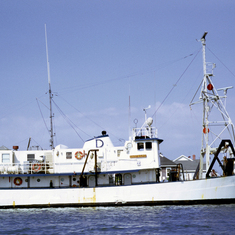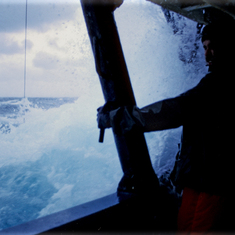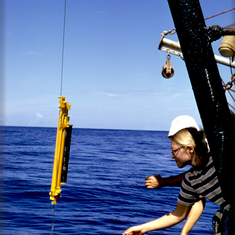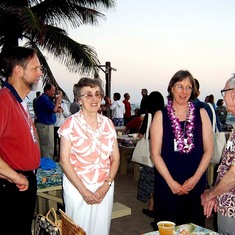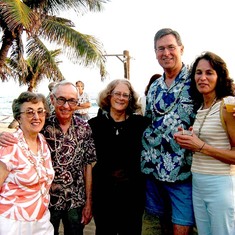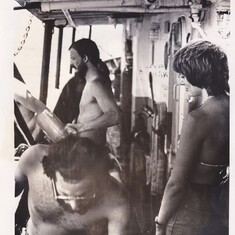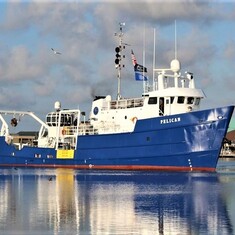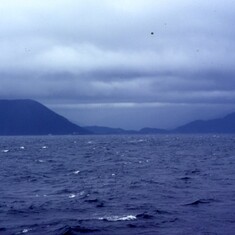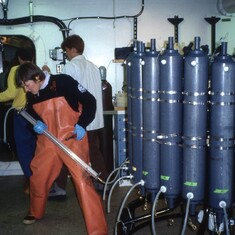My seagoing career begins with the chance offer that I work for an acquaintance, Danny Martin, on his fishing boat. I am working at the soda fountain of the Pass-a-Grille drugstore, and fishing sounds a lot better. The first day of my life out at sea, with a 360-degree horizon of water, is at age seventeen. I am now the new hand aboard the fishing boat Wye Goodie, out of Pass-a-Grille, Florida. It is 1942, wartime, and by necessity we make day trips. Civilian boats are not allowed out of port during darkness. We are on our way to the grouper reefs on the outer continental shelf west of Florida, and it is not a nice day. Curtains of rain descend from squalls all around. A waterspout descends out of one cloud, and then another and another. We stay on our course through the squalls, keeping an eye on multiple waterspouts, and I am seasick. I have been assigned to take the helm and maintain a compass course. Watching the spinning compass as the little boat pitches through the waves reinforces the effect of rise and fall of the boat. The more experienced helmsman knows that it is better, once on the correct course, to steer toward something distant—a cloud, a squall, anything transitory except a waterspout— and only occasionally correct course by observing that spinning compass. That is my first seaman’s lesson of the day.
After about two hours on course, Danny Martin, the owner, pulls back the throttle. Now we have to find the grouper. They are, of course, a bottom fish that usually stays near coral or other reefs. The reefs are twenty-five fathoms below the boat, but there is a way to find reefs and grouper. Danny hands me an armed lead line. The armament is Fels naptha soap. A cavity in the bottom of the sounding lead has been pressed full of the soft soap and the surface of the soap smoothed. Standing near the bow of the boat, I throw the lead as far forward as possible and the boat overrides it as it falls. I bounce the lead on bottom when it is directly beneath me and then retrieve it to examine the surface of the soap. Stuck to it are grains of black and white sand. I call out, “salt and pepper,” scrape the soap clean with my knife, and do another cast of the lead. Again it is salt and pepper. Another cast, and this time there is no sand but the smooth surface of the soap is dimpled from contact with coral or limestone. I call out, “Rock.” Danny, who is at the wheel, immediately tosses a piece of crumpled paper over the side. He brings the boat around and we drop the anchor a bit upwind of the floating paper. We are now anchored over hard, rocky bottom or live coral.
To lure the fish, Danny produces a brown paper bag and a handful of sardines he had caught previously and stored on ice. Into the bag go the sardines and also the sounding lead. The bag is now tied shut above the lead. He lets the bag with lead and fish fall to bottom and bounces it up and down long enough for the bag to disintegrate and release the sardines. This process is called chumming, which draws in the grouper with some tasty food. We then put sturdy hand-fishing lines over both sides of the boat. At the end of each line is a five-pound sinker into which have been cast steel eyes to which two swivels, steel leaders, and large hooks are attached. Each hook is baited with a chunk of fish. As our sinkers hit bottom, we know at once we have a catch. With two large groupers on the line, it is not a simple matter to pull them in. When both fish decide to swim downward, the only recourse is to bend the line over the gunwale and hold on until they change their minds. When the groupers finally have been hauled up twenty-five fathoms, their eyes are popping from the sockets and their bodies are distended by the rapid decompression from five-times the sea-surface atmospheric pressure at the sea bottom.
Grasping them by the open jaw, I haul each grouper over the gunwale and, continuing to hold the jaw, remove the hook. The fish are tossed into a barrel, the hooks re-baited and dropped to bottom. Immediately the process begins again. Two more groupers are fighting against the line and are brought to the surface as rapidly as possible. Most of them are so large their tails are slapping the deck as I hold them waist-high to unhook them. The smallest, that Danny derisively calls piss-cutters, are about eighteen inches long. After half an hour, we have a barrel full of groupers and no more are biting. We have removed all groupers from that particular bit of sea floor. It is then time to pull up anchor, motor a short distance, and start sounding again: Salt-and-pepper, salt-and-pepper, salt-and pepper, salt-and pepper, rock. Toss the crumpled paper, come about upwind, anchor, chum with sardines, and start pulling in groupers again. Except for a short lunch break, this goes on for about eight hours and it is then time to start back. We have to be back, and be checked off by the Coast Guard, before dark. Back in Boca Ciega Bay, we dock at the fish house and unload the fish one at a time with a big hook. They are bought for eight cents per pound, live weight. At the time, for a kid out of high school, my share of this is a very good wage.
At the dock, we are met by two women who ask us, “Did you see our men out there?” These are wives of men on a grouper boat that did not return the day before and now is not likely to return. Indeed, we saw nothing but waterspouts, not another boat of any kind or any debris of a boat that might have had too close an encounter with a waterspout. The women continue to appear each afternoon for several days. Finally, they accept reality. Encounters with newly widowed women bring home the fact that this is a hazardous occupation, perhaps especially so on the
Wye Goodie. Although a little eccentrically shaped, she is a typical Florida fishing boat about forty feet long with a combination cabin-engine-room forward and an open after deck. The
Goodie was built by a man of that name, Goodie, who is now too old to fish. One might say that is also true of the boat, but it is a boat Danny could afford to purchase. Each time we start the engine at sea, which is every time we move to a new fishing spot, we all don life jackets. The hope is, apparently, that in the event of an explosion of the gasoline-powered engine, some loose scraps of wood, plus the life jackets, may keep us afloat. But the chance of being found is nil. We learned that from the two women. A person floating at sea in a life jacket is all but invisible, a head bobbing up and down between waves.The grouper banks are far offshore and vast. In wartime, perhaps half a dozen boats are working out there and we never see other fishing boats. The sharks will bring our discomfort to a quicker end than just floating forever in the life jacket. Of course, at seventeen I have not yet had any close encounters with death and think I am immortal. I am enjoying the work and after the first day never that summer am I seasick.
Danny Martin is not the typical fisherman. Only two or three years older than I, he had been a whiz in high school and the local junior college. His father is an attorney in St. Petersburg and commutes to his office every day on the bus from Pass-a-Grille, where he and his two children live (with no wife-mother) in a bay-front home. Danny is interested in science and understands that I am too. We both are observant at sea and notice things a fisherman might not think interesting. Like many very bright people, he has his eccentricities. I once heard him say that he had no intention of marrying any woman who would consider him marriage material. He has grown up without a mother and with a father who, like Danny, is quiet, taciturn, and opinionated. Fishing has become Danny’s life. In spite of being smart and well-read, he seemingly has no motivation for higher education. He has embraced the simple, almost monastic life of a fisherman.
We are a cheerful little group, usually three of us, putting in our long day of fishing. I arrive at the fish house by bicycle in the dark. We pull blocks of ice down to the boat. In the early morning light we motor down to the Coast Guard boat near the inlet and there we stay until the Coast Guard person on duty can actually see the sun. Only then are we allowed to begin our two-hour run out to the grouper reefs. After that first stormy day, the weather has settled into the Florida summer routine. In the morning we motor into a light sea breeze from the west. Out over the continental shelf the days are normally very calm and clear. At the time we are returning, thunderstorms are building to our east and we return through rain-squalls to unload our catch. By essentially randomly steering out to a very large area of outer continental shelf reefs, and being almost the only fishing boat out there, we waste little time chumming up grouper and catching every one on a reef.
It never occurs to us, or to any other fisherman, that every time we do that we eliminate groupers from that part of the sea floor. It didn’t matter then, because there were so few fishermen and so wide a continental shelf. Now, of course, fishermen have outnumbered the groupers and just about caught them all. A thirty-pound grouper, that we would have considered the usual, and caught them two at a time as quickly as we could pull them out of the water, is now a rarity.
Although I enjoyed the fishing life, it did not last long. I was young, had a girl friend, and wanted to take days off. Danny needed someone every day, so he fired me as soon as he found someone who would agree to go to sea every weekday, every week. That brief introduction to the sea did serve to make me ready to embrace oceanography. When I began to go to sea on larger and mostly steel-hulled ships, it all seemed so safe and easy compared to those trips on the
Goodie. Danny continued to be a fisherman all of his rather short life. Some old hand from Pass-a-Grille sent me a newspaper clipping stating that Danny had died at age 49 after falling from his boat during stormy weather in the Cayman Islands. The old
Wye Goodie, that we thought might blow up or disintegrate any day, outlived Danny. In the 1990s, I was working with a research group using a boat from Skidaway Island on which we travelled up and down the intracoastal waterway in Georgia. As we were passing St. Catherines Island one day, I noticed a familiar, oddly shaped little boat at a dock. With binoculars I was able to read the name on the transom:
Wye Goodie. --Do not use or reproduce without permission--
